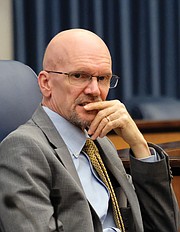Brook Road bike lanes get the green light
Jeremy M. Lazarus | 2/1/2019, 6 a.m.
Cars and trucks will have to surrender half of their lanes on Brook Road to cyclists.
That’s the final decision of Richmond City Council, which voted 6-3 to install bike lanes and uphold a nearly 4-year-old approved plan for developing biking infrastructure in the city.
“I don’t think council should be legislating bike lanes,” said 4th District Councilwoman Kristen N. Larson.
The city has not said when the bike lanes would be installed, but it is expected to start later this year following completion of a utility project to replace residential and main underground pipes.
The bike lane issue dominated the council’s nearly six-hour meeting Monday at which council also gave the green light to the operation of electric scooters and largely scrapped a 20-year-old residency requirement for city government executives and directors.
In addition, the council also voted to end free parking in Downtown for drivers with handicap licenses or placards, embraced a nonbinding resolution that calls for the city to spend $800 million on new school construction over 20 years and approved the Richmond School Board’s request to shift about $4.7 million from a planning fund for new schools to a maintenance fund to allow the money to be used to fix leaking roofs and address other urgent problems in existing buildings.
The vote on the Brook Road bike lanes was a bitter pill for Council Vice President Chris A. Hilbert, 3rd District, and Councilwoman Kim B. Gray, 2nd District.
The two, who split representation of the Brook Road corridor, spent months trying to stop the addition of bike lanes that they believe would make the street more dangerous for residents and cyclists.
Mr. Hilbert argued that limiting traffic to just one lane in each direction on the 3.5-mile stretch between Azalea Avenue to the north and Charity Street would force traffic onto Chamberlayne Avenue, raising the risk to lower-income residents who live there, he said.
Ms. Gray said Brook Road residents would find it harder to get in and out of their driveways, and she predicted major conflicts between cyclists and trucks in the southern portion of the roadway that goes through a busy commercial and industrial area.
She also said that the majority of residents along the street were unaware that Brook Road was targeted for bike lanes.
However, Jakob Helmboldt, who manages city bike lane development, pushed back against the objections. He insisted that the plan for the new bike lanes will use the latest engineering concepts and take into account turns at major intersections and parking concerns.
He told the council that Brook Road is now too wide for the level of traffic it carries, encouraging most drivers to speed. The bike lanes, once installed, would be like putting the road on a diet that would calm traffic and create more safety for bikers, he told the council.
While he acknowledged that most of the bike lanes in the city are not greatly used, Mr. Helmboldt argued bike use will rise once the plan is more built out. “If you build it, they will come,” he said.
Before the vote, more than 60 people lined up to urge council either to support or kill the Hilbert-Gray legislation that would have overturned nearly 20 years of effort to install bike lanes on the street.
“I want the vehicles on Brook Road to be forced to drive the speed limit,” said Michael Simon, a Brook Road resident. “This is exactly what a growing progressive city needs.”
“I’ve never in my life been able to ride my bike more than a few blocks from my house. It just isn’t safe,” said Stella Davies, a 16-year-old Maggie Walker High School student. “Please vote no on this ordinance and give me and others like me a safe route to school.”
But Barton Heights resident Jonathan Davis urged the council to stop building what he called “a bridge to nowhere,” while disrupting traffic. “Not every road needs a bike lane, just like every intersection does not need a traffic light or crosswalk,” Mr. Davis said.
And Ken Nash of W.W. Nash Companies warned of the problems that would arise around his busy operation at 1400 Brook Road.
“We have over 100 vehicles a day coming into our facility, and this bike lane will create a hazard,” he said.
But only Councilwoman Reva M. Trammell, 8th District, joined in voting against the bike lanes.
Fifth District Councilman Parker C. Agelasto issued the harshest verdict to opponents. He said objecting residents along Brook Road can only blame themselves for not paying attention as the plans were being made.
He said it was too late for the city to change course after having invested so much time, money and energy. He said it would send the wrong message to stop this phase of a plan to install 135 miles of new bikeways within the 10 next years.
On the residency requirement, City Council voted 5-3 to limit a requirement for top city officials to live in the city to just 15 executives, down from the current 186 city officials who now must do so.
Aimed to assist in attracting people to work at City Hall, the ordinance also provides for granting waivers for those still covered that would permit them to live up to 100 miles away from Richmond.
The legislation was spearheaded by Councilman Andreas D. Addison, 1st District, and Michael J. Jones, 9th District. Ellen F. Robertson, 6th District, also was listed as a patron.
Mr. Agelasto, whose residency has been questioned within the 5th District, did not participate in the debate or the vote.
The measure was approved over the opposition of Ms. Gray, Ms. Trammell and Mr. Hilbert.
In other business, the council:
• Renamed a stretch of a North Side park called the Cannon Creek Greenway in honor of Dr. Charles Price, who had led the effort to make it more usable, and
• Authorized the director of Public Works to begin a program to allow private companies to provide electric scooters for rent. The council stripped provisions to limit the total number of scooters to 1,500 in any year. The approved plan clears the way for companies to operate unlimited numbers, depending on the demand.









